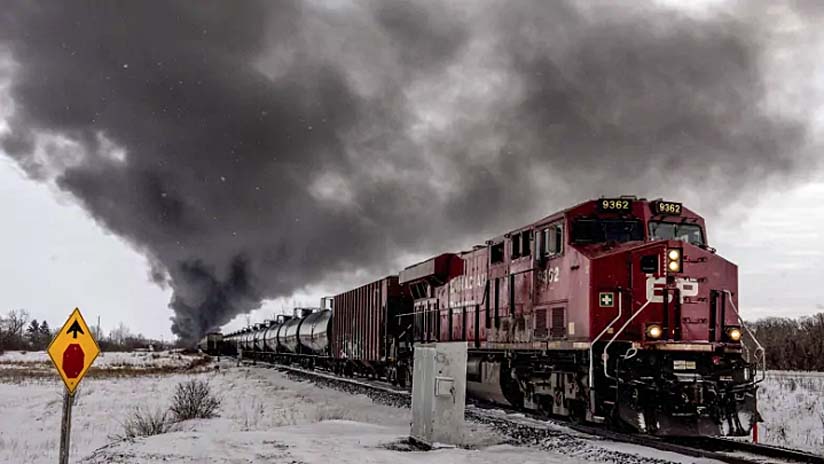
Saskatchewan - Transport Canada (TC) says the section of Canadian Pacific Railway (CP) track marked by two recent oil train derailments
in Saskatchewan was inspected by regulators three times in the last year.
But it won't say what kind of "minor non-compliances" were found during two of those inspections.
Two CP trains carrying oil have recently jumped the tracks on the company's Sutherland subdivision, near the small hamlet of Guernsey,
Saskatchewan.
The incidents, one on 9 Dec 2019 and a second last Thursday, occurred about three kilometres from each other.
Nobody was injured or killed in either crash.
But the latest incident produced enough black smoke to prompt the voluntary evacuation of Guernsey, a community of about 100 people.
Hours after last week's crash, federal Transport Minister Marc Garneau ordered all large trains carrying dangerous goods to slow their speeds for the next
month.
Previous Inspections
TC has confirmed it inspected the Sutherland subdivision track three times in the last year, using a track inspection vehicle.
On 7 May 2019 and 27 Aug 2019, the regulator "found minor non-compliances that were identified to CP, which made all repairs within 30 days as
required," according to a TC spokesperson.
After the Guernsey-area derailment on 9 Dec 2019 TC returned to the track for a third time on 29 Jan 2020 of this year.
It found "no instances of non-compliance."
A week later, the second derailment occurred.
"It would be inappropriate to speculate on the cause of a derailment before the Transportation Safety Board of Canada (TSB) has concluded an
investigation," the TC spokesperson said.
CBC News asked TC to specify what the non-compliances were.
It declined to do so, referring inquiries to CP.
CP did not respond to the same request for information about the non-compliances Wednesday.
CBC News also asked CP for the results of any recent inspections the company may have conducted on the track.
"CP meets or exceeds all federal standards on track inspections," a company spokesperson said in response.
A resident who lives near the site of the December derailment, Melanie Loessl, said CP did some work on the track at various points in 2019.
CP also declined to comment on that.
Coincidences Can Happen
Barry Prentice, a professor in supply chain management at the University of Manitoba's Asper School of Business, said the two clustered derailments could just
be a twist of fate.
"We always say at the university, an observation is an observation, two observations is a pattern, and three observations are a trend," Prentice
said.
"So I'd certainly want to see that third observation before I got too worried. Coincidences can happen."
The TSB is investigating both incidents for their causes and contributing factors, and to determine whether any safety recommendations need to be
issued.
"Neither TSB investigators nor the board can assign fault or determine civil or criminal liability," a TSB spokesperson recently told CBC
News.
"The fact that TSB is investigating does not preclude any other agency," such as a police service, from "investigating in accordance with its
own mandate," the spokesperson added.
CP has its own police force, with officers employed by CP assigned to 25 field offices spread across six provinces and 14 American states.
CP Police Service "is not conducting a criminal investigation into the 6 Feb 2020 matter," the CP spokesperson said.
"CPPS and the RCMP were on site to protect the perimeter and ensure public safety."
An RCMP spokesperson confirmed that police force is not investigating the derailment either.
Loads Increased in 2018
New information from TC indicates the volume of dangerous goods on the Sutherland subdivision has increased in the last two years.
TC requires railway companies to conduct risk assessments at least every three years on "key routes" where large trains cumulatively transport
10,000 or more loaded tank cars of dangerous goods a year.
The assessments look at 28 different risk factors, everything from the speed of trains to geohazards.
The Sutherland subdivision was designated a key route in January 2018, according to TC.
"As part of the department's rail safety oversight program, in 2018, TC verified that CP had conducted the risk assessment," a TC spokesperson
said.
Both CP and ConocoPhillips, which owned the bitumen on board last week's train, confirmed the train was using newly built tank cars meant to be more
puncture-resistant than the ones that exploded in Lake Megantic in 2013.
TC endorsed the new TC-117 cars as being "safer" than their predecessors.
But at least 12 of the tank cars last week caught fire, according to the Saskatchewan Public Safety Agency, and drone footage showed two large pools of oil
staining the highway near the track.
CBC News asked if the incident prompted concern about the TC-117 cars.
"The TSB is conducting an investigation," a TC spokesperson said.
"We will await the outcome of that investigation.
"The department will not hesitate to take appropriate action should we identify any safety or regulatory deficiencies."
Guy Quenneville.
provisions in Section 29 of the Canadian
Copyright Modernization Act.

